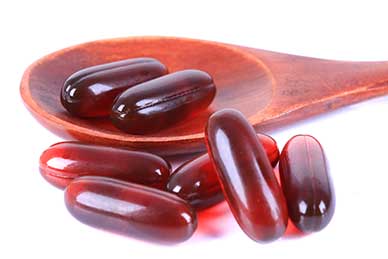People who suffer from autoimmune skin disease may find new hope in treatment options, as new research shows a link between psoriasis and vitamin D levels.
Psoriasis is a common skin problem, affecting 125 million people worldwide. This means that approximately one to three percent of the population has this devastating skin disorder and deal with the accompanying pain, thickened skin and rashes on a daily basis. There are several treatments for psoriasis, but these can have debilitating side effects and may not always work. However, new research on psoriasis and vitamin D offers hope that getting more of a simple vitamin could provide some relief for this, and possibly other, autoimmune skin disorders.
What Is Psoriasis?
 Psoriasis is an autoimmune condition in which skin cells divide more quickly than normal—at times more than 10 times as quickly. This causes sufferers to have areas of reddened, irritated, thickened skin covered with the distinctive white scales of dying skin cells. These areas of skin are painful and inflamed during outbreaks. In addition, many people with psoriasis get infections on their broken skin and even suffer from psoriatic arthritis, a condition in which joints are affected by the fast cell turnover that defines this disease.
Psoriasis is an autoimmune condition in which skin cells divide more quickly than normal—at times more than 10 times as quickly. This causes sufferers to have areas of reddened, irritated, thickened skin covered with the distinctive white scales of dying skin cells. These areas of skin are painful and inflamed during outbreaks. In addition, many people with psoriasis get infections on their broken skin and even suffer from psoriatic arthritis, a condition in which joints are affected by the fast cell turnover that defines this disease.
There are few treatments for psoriasis. Most of these treatments are oral drugs such as aspirin and steroids that decrease the fast cell turnover but also compromise the immune system or cause other ill effects. Many people with psoriasis can manage their symptoms, but a cure remains elusive.
The Importance of Vitamin D
According to new research, low vitamin D levels may be partly to blame for psoriasis—and increasing levels of vitamin D may be a partial cure for the disease. Vitamin D is known as the sunshine vitamin because most people make this vitamin in skin cells exposed to natural sunlight. People in areas with long and dark winters are more likely to be deficient in this vitamin and more likely to have psoriasis as well. Vitamin D is not only crucial for forming healthy teeth and bones, but important to the immune system as well.
It should come as no surprise then that light therapy is a popular and effective therapy for psoriasis. Studies have found that this light therapy is even more effective for the treatment of this skin disorder when used in conjunction with a vitamin D cream.
Psoriasis and Vitamin D Levels: New Connections
Many people who suffer from psoriasis have noticed that their symptoms improve in warmer months when they get more sunlight. This is not just a coincidence; new research suggests that vitamin D plays a role in modulating the immune system. High levels of vitamin D appear to down-regulate levels of the cells involved in autoimmune attack–the same cells involved in psoriasis and other autoimmune diseases. Several new psoriasis therapies target vitamin D levels in order to reduce the symptoms of psoriasis. Indeed, getting enough vitamin D appears to make all the difference when it comes to psoriasis and other autoimmune diseases.
Could You Have a Vitamin D Deficiency?
Anyone can develop a deficiency of this important vitamin. However, there are a few groups who are less likely to be getting the vitamin D as they need. These include infants and elderly people who are unlikely to be outside as much as people of other ages. In addition, people who live at higher latitudes or who do not get as much exposure to strong sunlight are at risk. Even if an area in a high latitude is generally clear of cloud cover, the sunlight’s rays come from an angle that makes them weaker and less able to cause reactions in the skin that lead to the production of vitamin D. Finally, people with darker skin are more likely to suffer from psoriasis because the melanin in their skin absorbs a lot of the energy from sunlight.
In keeping with this theory, many people who have psoriasis see their symptoms worsen in the cold weather months. In addition, these people often see their thickened, scaly skin disappear after light therapy. Psoriasis and vitamin D levels appear to be more linked than we ever could have believed before. Could this serious skin disorder be caused by a mere vitamin deficiency? While the answer is not likely this simple, there definitely appears to be a link between the two.
If you have psoriasis or another autoimmune skin disorder and believe that a lack of vitamin D may be the culprit, there are a few ways to get more of this essential vitamin. Light therapy and simply spending more time in the sun is an answer for many. You can eat foods rich in vitamin D, such as oily fish, as well. Last, ask your doctor about whether taking a vitamin D supplement is right for you. Many people in northern latitudes find that they simply cannot get enough vitamin D without taking a supplement in the cold weather months. If this is true for you, then taking a simple vitamin may be the end to all of your scaly skin woes.
 According to researchers, fatty acids affect our bodies in a variety of positive ways. First, they are a good source of the fatty building blocks needed to myelinate nerve cells. Myelin acts as an insulator for nerve cells so they can send signals more rapidly. While we are young, we are still building new neural connections (and myelinating them!) so supplements containing omega 3 for children can be of huge benefit.
According to researchers, fatty acids affect our bodies in a variety of positive ways. First, they are a good source of the fatty building blocks needed to myelinate nerve cells. Myelin acts as an insulator for nerve cells so they can send signals more rapidly. While we are young, we are still building new neural connections (and myelinating them!) so supplements containing omega 3 for children can be of huge benefit. The problem for many modern people is that reducing light exposure can be a difficult task. We have televisions and devices that can be turned off, but these are not the only contributors to an increasingly light world. Many streetlights are high color temperature LED lights, which cause a huge range of negative health effects. In fact, the
The problem for many modern people is that reducing light exposure can be a difficult task. We have televisions and devices that can be turned off, but these are not the only contributors to an increasingly light world. Many streetlights are high color temperature LED lights, which cause a huge range of negative health effects. In fact, the  Our bodies make an enzyme called superoxide dismutase that removes oxygen free radicals, binding them to other molecules so they cannot cause damage. As we age, our bodies do not create this important enzyme as effectively. The result is that our cells suffer small amounts of damage that lead to the physical symptoms and increased health risks associated with growing old. For centuries, ancient explorers searched fruitlessly for the “Fountain of Youth,” but we are still left with no real way to slow down aging, let alone prevent or reverse it.
Our bodies make an enzyme called superoxide dismutase that removes oxygen free radicals, binding them to other molecules so they cannot cause damage. As we age, our bodies do not create this important enzyme as effectively. The result is that our cells suffer small amounts of damage that lead to the physical symptoms and increased health risks associated with growing old. For centuries, ancient explorers searched fruitlessly for the “Fountain of Youth,” but we are still left with no real way to slow down aging, let alone prevent or reverse it. Several studies have found
Several studies have found  Folic acid is arguably the
Folic acid is arguably the 